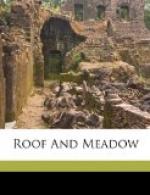While we were still watching, the snake, having comfortably (for a snake) breakfasted, saw the hole uncovered and stuck out his head. We made no move. Slowly, cautiously, with his eye upon us, he glided out, up to the big bunch of breakfast in his middle. This stuck. Frantically he squirmed, whirled, and lashed about, but in vain. He could not pull through. He had eaten too much.
There was just one thing for him to do if he would be free: give up the breakfast of toad (which is much better fare according to snake standards than pottage according to ours), as he had given up the dinner of frog. Would he sell his birthright?
Perhaps a snake cannot calculate; perhaps he knows no conflict of emotions. Yet something very like these processes seemed to go on within the scaly little reptile. He ceased all violent struggle, laid his length upon the netting, and seemed to think, to weigh the chances, to count the cost.
Soon he softly drew back into the cage. A series of severe contortions followed; the obstructing bunch began to move forward, up, farther and farther, until at last, dazed, squeezed, and half smothered, but entirely alive and unhurt, the toad appeared and once more opened his eyes to the blessed light.
The snake quickly put his head through the hole, slipped out again, and glided away into his freedom. He had earned it. The toad deserved his liberty too, and I took him into the strawberry-patch.
The minister looked on at it all. Perhaps he didn’t learn anything. But I did.
THE MARSH
[Illustration]
THE MARSH
And breathe it free, and breathe
it free,
By rangy marsh, in lone sea-liberty.
I
It was a late June day whose breaking found me upon the edge of the great salt-marshes which lie behind East Point Light, as the Delaware Bay lies in front of it, and which run in a wide, half-land, half-bay border down the cape.
I followed along the black sandy road which goes to the Light until close to the old Zane’s Place,—the last farm-house of the uplands,—when I turned off into the marsh toward the river. The mosquitos rose from the damp grass at every step, swarming up around me in a cloud, and streaming off behind like a comet’s tail, which hummed instead of glowed. I was the only male among them. It was a cloud of females, the nymphs of the salt-marsh; and all through that day the singing, stinging, smothering swarm danced about me, rested upon me, covered me whenever I paused, so that my black leggings turned instantly to a mosquito brown, and all my dress seemed dyed alike.
Only I did not pause—not often, nor long. The sun came up blisteringly hot, yet on I walked, and wore my coat, my hands deep down in the pockets and my head in a handkerchief. At noon I was still walking, and kept on walking till I reached the bay shore, when a breeze came up, and drove the singing, stinging fairies back into the grass, and saved me.




